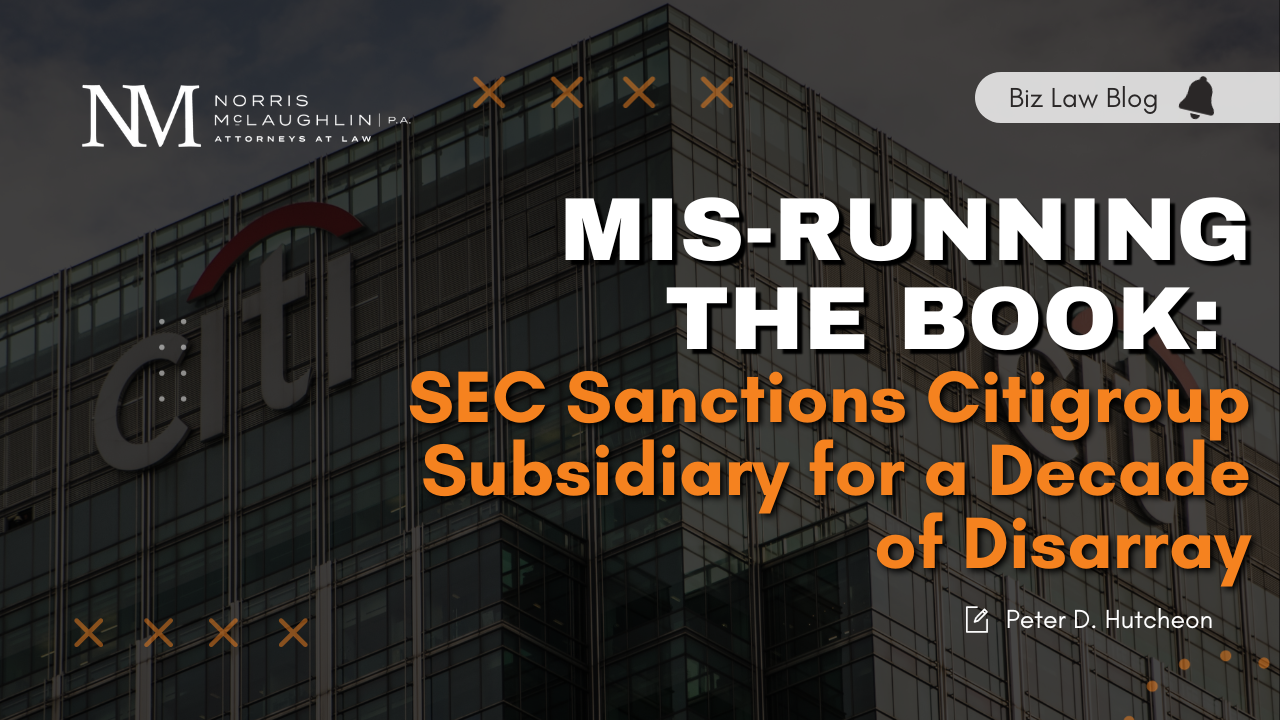Mis-Running the Book: SEC Sanctions Citigroup Subsidiary for a Decade of Disarray

According to the Author’s law school professor of Securities Regulation (in the first volume of the six volume “Securities Regulation” at page 164 of the 2nd Edition, 1961, by Professor Louis Loss, a reasonably recognized figure in the field), the first use of a syndicate of investment banking firms to sell securities was by Jay Cooke in 1870 to sell bonds of the Pennsylvania Railroad. This nugget of history can be found as well in a seminal compendium of history and practice titled “Corporate Finance and the Securities Laws” (“Corporate Finance”), a 1991 publication written by one of the “Deans” of securities law practice, Charles J. Johnson, Jr., who spent his career with the law firm Brown, Wood, Ivey, Mitchell and Petty, founded in 1914 and absorbed in 2001 by the Chicago firm of Sidley & Austin. I had the good fortune to work with Charlie Johnson on several matters and own a prized autographed copy of his book. Corporate Finance describes the historical development of practices used to structure and regulate syndicates of investment banks in the sale of securities.
Syndicate practices evolved during the latter part of the 19th century and the early years …(of the 20th) as corporations sought to raise the vast amounts of capital that were required to build the country’s railroads and to finance the growth of American industry. By the turn of the century, as the banking houses gained prestige, it became common for them to purchase issues and to be responsible for their sale… The increase in the size of financings strained the risk-bearing capacity of the individual investment banking firms. Thus, it became necessary for firms to join together in syndicates to share the underwriting risk. …. Where securities are distributed through a syndicate of investment banking firms, one or more firms will be designated by the issuer as the managing or lead underwriter or underwriters. … one will be designated as the ‘book-running’ manager and its name will appear first on … the prospectus and in the same position on the tombstone advertisement (in the financial press).
- Corporate Finance and the Securities Law (2015)
One of the key responsibilities of the managing underwriter or ‘book-runner’ is to keep detailed and accurate records of expenses incurred in connection with the underwriting of securities. Pursuant to the Agreement Among Underwriters, the Book-Runner, along with the other syndicate members, is entitled to reimbursement for those expenses from the underwriting fees (often referred to as the discount or spread between what the syndicate pays the issuer and what public investors pay for the underwritten securities). As the U. S. Securities and Exchange Commission (“SEC”) charged in an Aug. 29, 2023 Order Instituting Administrative and Cease-And-Desist Proceedings (the “Order”) against Citigroup Capital Markets, Inc. (“Citi”), Citi for a ten-year period from 2009 to 2019 simply recorded indirect expenses not on the basis of actual costs, but rather as “a fixed percentage of the underwriting fee.” It then, according to the Order, “used ‘allocation grids’ to divide the total indirect expenses for [an] offering into specific categories of expenses, including ‘word processing, copying, printing’ and ‘travel and entertainment.’”
As laid out in the Order, Citi was the “billing and delivery bank” as the Book-Runner of syndicates that Citi put together by “enlisting” other investment banks to serve as underwriters of a securities issue. In that same capacity, Citi “was responsible for deal settlement, which included paying other syndicate members their pro rata portions of the fees earned by the syndicate, less each member’s pro rata share of any expenses incurred in connection with the securities offering.” Nonetheless, during the 10-year period from 2009 until May 2019, Citi simply “booked” the indirect expenses on equity offering at 7% of the underwriting fee with a cap of either $75,000 or $85,000, depending on the amount of that underwriting fee. In the case of offerings of debt securities, indirect expenses were “booked” at 10% of the underwriting fee, with a cap of $75,000. The practical result of this arbitrary system was quite possibly an unjustified increase in total returns for Citi (and a consequential net reduction in fees paid to other syndicate members); but absent a record of the actual indirect expenses there was also no way to tell if Citi received too much OR failed to recoup some of its own indirect expenses in some underwritings.
Citi did, however, record its arbitrarily calculated indirect offering expenses in Citi’s general ledger, as required by Rule 17a-3 under the Securities Exchange Act of 1934, as amended (the “1934 Act”). The Order notes that Citi “did not know the basis for its method calculation of indirect expenses” and that Citi “conducted no review or similar process to verify that its method of calculating indirect expenses” was reasonable. That all changed in May 2019 when Citi voluntarily revised its method of calculating indirect expenses. It was with this background that the SEC found in the Order that Citi had for ten years violated its recordkeeping requirements under Section 17(a) of the 1934 Act and Rule 17a-3 thereunder, as Citi’s underwriting records did not reflect “all assets and liabilities, income and expense and capital accounts.” As a result, the Commission ordered Citi to cease and desist from violating the cited recordkeeping requirements. In the Order, the Commission further censured Citi and imposed a civil money penalty of $2.9 million. Citi consented to the entry of the Order and complied with the payment of the civil penalty. In the SEC’s Aug. 29, 2023 Press Release concerning this matter, the Deputy Director of the SEC Division of Enforcement said:
“Underwriters serve a critical role as gatekeepers in securities offerings. They perform essential functions, including investor protection and also helping companies access capital to grow and innovate... Recordkeeping failures such as these, perpetuated over at least a decade, can undermine the viability of those functions.”
It is not without a certain irony that Citi’s website asserts:
The strength of our underwriting, sales and trading and distribution capabilities span asset classes and currencies, providing us with an unmatched ability to meet the needs of our clients.
Nor can one be certain that the decade of neglect in recordkeeping at Citi is not suggestive of other issues in the corporate culture. It may not be a pure coincidence that on Wednesday, Sept. 13, 2023, Citi’s parent Citigroup, Inc., announced a major management shakeup (as reported in The Wall Street Journal on the following day), the Journal noting that:
“Simplifying Citigroup has been a top goal…since early 2021. The complexity has created angst for Citigroup’s regulators and its investors. Regulators are demanding the bank improve safeguards and data programs.”
There was no particular venality at Citi, or drive to maximize returns in its wholly arbitrary system of “determining” indirect expenses. It was simply laziness and neglect. Yet one might conclude that being careless in small things is suggestive of an absence of commitment to excellence overall.
If you have any questions or concerns pertaining to this blog or the topic of underwriting, please feel free to reach out to me at pdhutcheon@norris-law.com.




